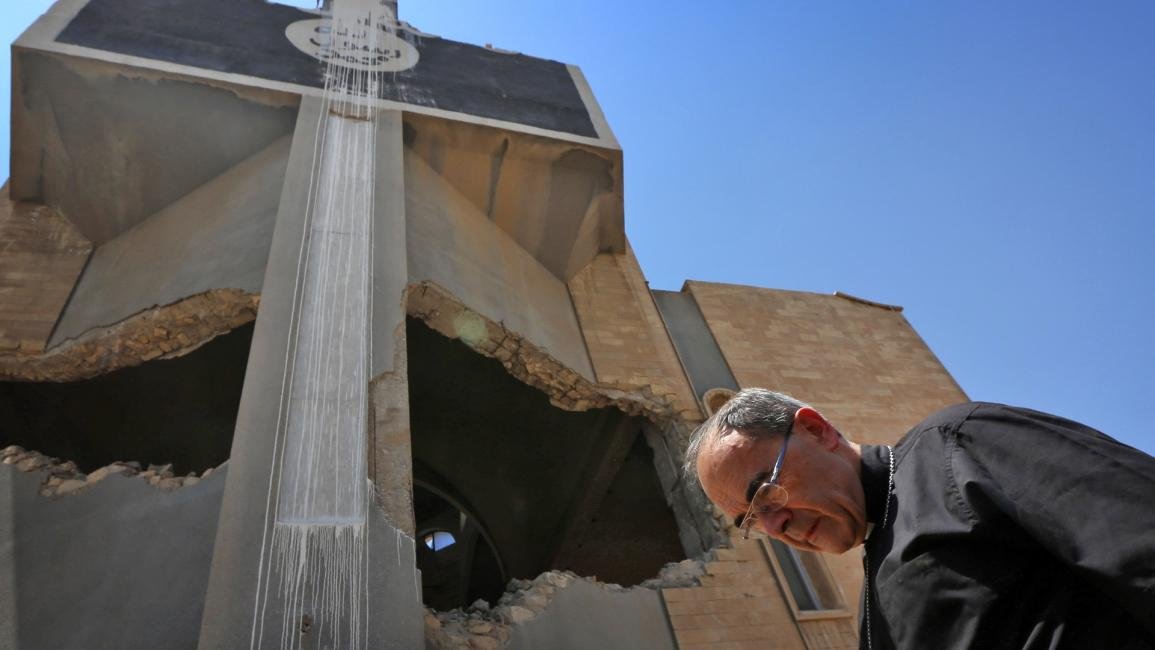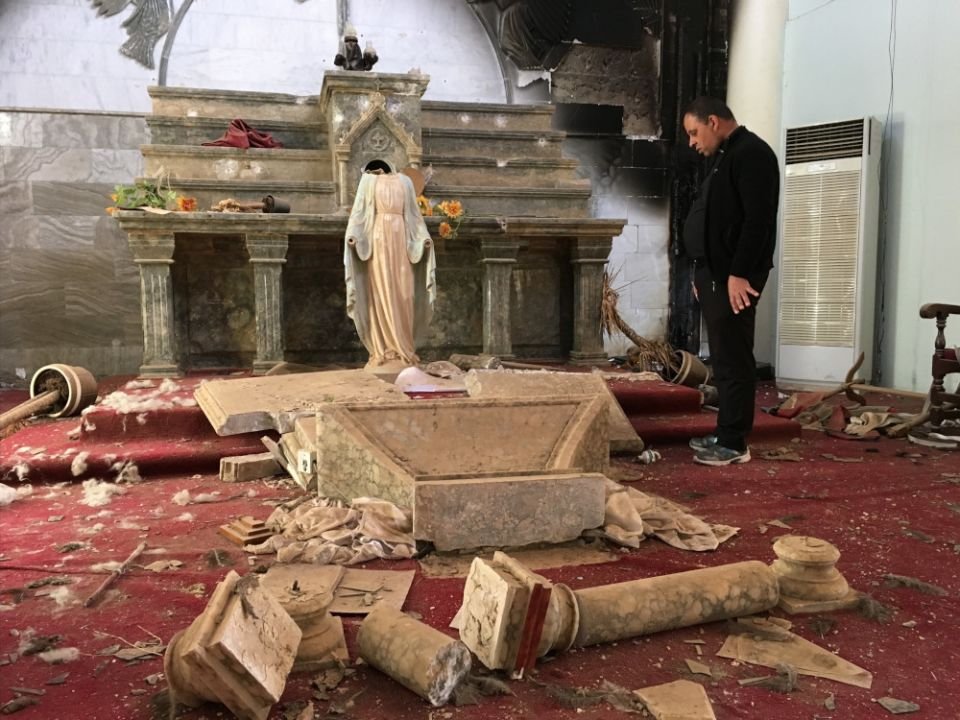Iraq’s Christian Genocide of the 21st Century



By Adhid Miri, PhD
Part IV
Iraq is as complex and fascinating as its history. There is a strong link between the two. Iraq is home to many religions and many ethnic backgrounds. Unfortunately, it is also home to many conflicts, with and without the involvement of foreign parties.
However complicated, the beauty of Iraq lies in its diversity. It is impossible to find the right words to do justice to the varied communities in Iraq, each suffering tremendously under the burden of recent history. They now seek recognition for their past and assurance for a safer future.
Pope Francis visits Iraq
Pope Francis visited parts of northern Iraq once held by Islamic State (IS) militants on the third day of his historic trip to the country on March 7, 2021, and he prayed among ruined churches in Mosul, the former IS stronghold.
Since his visit to Baghdad on March 5, 2021, Pope Francis has called for an end to violence and extremism, and he has stated his support that Iraq’s dwindling Christian community should have a more prominent role as citizens with full rights, freedoms, and responsibilities.
In Mosul, the Pope visited Church Square to pray for the victims of the war with the Islamic State group, which left thousands of civilians dead. Surrounded by the tottering ruins of the square’s four churches, he said the exodus of Christians from Iraq and the broader Middle East had done “incalculable harm not just to the individuals and communities concerned but also to the society they leave behind.”
Pope Francis said, “How cruel it is that this country, the cradle of civilization, should have been afflicted by so barbarous a blow, with ancient places of worship destroyed and many thousands of people — Muslims, Christians, Yazidis and others — forcibly displaced or killed.”
Cardinal Louis Raphael Sako, Patriarch of Babylon of the Chaldeans and head of the Chaldean Catholic Church expressed that Pope Francis is seeking to turn a page in Christian-Muslim relations with his visit to the UAE in February 2019. “Pope Francis is saying that this is enough, let us live in peace, love, tolerance and to renounce violence and hatred.” The Pope hopes to promote interfaith dialogue and seeks to combat religious fanaticism. He calls for all faiths to evaluate the situation of Christians in the region and emphasize the values found in holy books for a peaceful co-existence between humankind.
The Pope’s visit gives the beleaguered Christians and minorities of Iraq a message of hope. It is the first-ever papal visit to the country. Jesuit Father Joseph Cassar, the Erbil-based country director for Jesuit Refugee Service, noted that the theme of Pope Francis’ visit is “You are all brothers.”
Beauty in diversity
The accumulation of violence in Iraq over decades means that every new conflict will plant a seed for the next one. It is terribly difficult to find an answer to breaking this cycle of violence. Iraqis must maintain that diversity, respect it, promote it, and preserve it.
Chaldean, Syriac, and Assyrian Christians represent some of the oldest Christian communities in the world. Their culture and religious identities are rooted in Mesopotamia’s Sumer, Babylon, and Assyrian civilizations. In recent years, Christians in Iraq have been victimized by the Baath Party, the Islamic State, and Shiite-led governments in Baghdad.
In 2003, Iraq’s Christian population numbered over 1.5 million. Today, less than 250,000 Christians remain in Iraq. Their reality is grim. The remaining Christian families suffer persecution and neglect. They have limited access to health care, education, and employment opportunities. The plight of Christians in Iraq continues to worsen, as they flee persecution and neglect. Those who want to go home cannot because conditions are not conducive to their return.
Since Iraq’s invasion in 2003, successive US administrations failed to stabilize, protect, and promote the well-being of the country’s minorities and Christian community. They also neglected security and economic development. Without active engagement by the US, Christians in Iraq live in peril and are at-risk of disappearing.
Rebuilding
Since the liberation from the Islamic State of Iraq and the Levant (ISIL) of East Mosul in January 2017, followed by West Mosul in July of the same year, humanitarian organizations have provided emergency assistance for the rehabilitation of infrastructure and public facilities in Mosul. However, the Mosul government and other stakeholders have expressed concern that without a coordinated strategy, the reconstruction effort is inefficient and has the potential to complicate long-term development of the city.
The international community has expressed its commitment to support the government-led reconstruction of Mosul and other recently liberated cities. The World Bank is also committed to working with Iraqi authorities to ensure that this much-needed reconstruction takes place in a sustainable, inclusive, and equitable manner to foster long term development and create opportunities for everyone.
Situated on the Tigris River’s western side, Old City in Mosul was one of Iraq’s cultural, trade, and economic centers for a long time. Before the ISIL conflict, the city boasted a rich history and a bright future. The recovery and reconstruction of Mosul would benefit greatly from a guiding framework that addresses emerging needs and the fast-changing reality on the ground in greater Mosul. The conflict left most of the population with damaged homes and infrastructure.
With over 70% of the towns in the Nineveh Plains destroyed, direct aid is indispensable. Diasporas would likely return to establish businesses or would invest in the province if there were guaranteed security. This sort of economic movement is necessary for people to return to their villages. When stability returns, the diverse mosaic of Iraq’s minorities and ideas will surely return as well. In the meantime, however, Christians’ and Yezidis’ only chance of survival is self-determination and self-governance.
Mosul, meanwhile, lies largely in ruins, the kind of misery that Iraqi officials fear is the perfect breeding ground for the Islamic State to reemerge.
People on the ground in Iraq are deeply concerned about lack of basic services, water, electricity, high unemployment, zero jobs or opportunities, and the lack of real re-construction efforts and community revitalization. The assessment picture is grim: NGOs and international aid organizations come and go with empty promises. Corruption and slow responses are the hallmark of their cosmetic aid.
Hamdaniya for years was the breadbasket and major supplier in the Nineveh Plains; however, today it is dotted with burned and abandoned homes. Mar Youhanna Putrus Moshe, Bishop of Mosul/Kirkuk/and Kurdistan Catholic Syriacs is fearful of the total death of Christianity in his town and wants his people to stay. The hours tick by fast with the continuous immigration of families to Australia.
ISIS has also completely looted and destroyed Qaraqosh. It was one of the more extreme examples of the group’s deliberate destruction of the communities they captured, surpassed only by their treatment of the Yezidi community in Sinjar. In a visit to the town in February 2017, no home, building, church, or other property appeared untouched. It was an entire town of jagged windows and burned-out husks of buildings. Most appeared to have been torched from the inside by explosives.
Similarly high levels of destruction were apparent in the nearby town of Karamles and in parts of Bartella. Although structures were still standing, nearly all the windows were blown out, and the walls were pocketed with shrapnel and bullet holes. In parts of Bartella, it appeared that at least one home per block had completely collapsed due to damage. Displacement was total, and while significant numbers of the Christian community fled to the nearby KRG or, to a lesser extent, other parts of Iraq, many left Iraq entirely.
To be continued…
